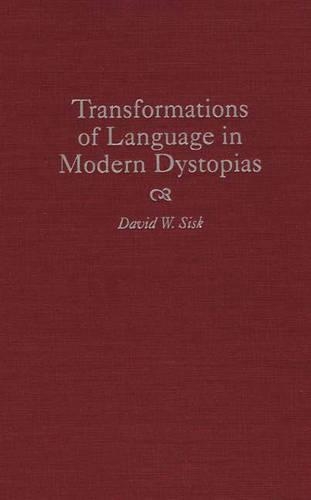
Transformations of Language in Modern Dystopias
(Hardback)
Publishing Details
Transformations of Language in Modern Dystopias
By (Author) David W. Sisk
Bloomsbury Publishing PLC
Praeger Publishers Inc
30th December 1997
United States
Classifications
Tertiary Education
Non Fiction
Philosophy of language
809.93372
Physical Properties
Hardback
224
Description
The brilliance of Orwell's "1984" has led to a backlash: many critics have asserted that, as the year 1984 has passed without taking the shape of his fiction, Orwell's novel and the dystopia in general have lost their affective power and relevance. But as the 20th century progresses, dystopian fiction has gained power as utopian fiction has become increasingly irrelevant. As an overtly didactic genre, dystopia extrapolates terrifying near-futures from disturbing current trends. In order to quickly create an atmosphere that is at once plausible and terrifying, dystopian writers almost universally turn to an idea certain to generate both fear and sympathy in the reader - the dual concept of language as the primary tool by which repressive societies stifle dissent, and simultaneously as the primary weapon used by rebels bent on understanding, resisting and countering such oppression. This volume traces the evolution of language's centrality in 20th-century dystopias in English, beginning with Huxley's "Brave New World" and Orwell's "1984". As dystopian fiction has branched out to embrace multiple viewpoints and agendas, the emphasis on language has remained at the centre of the dystopian impulse. These include the first-person narrative dystopia, such as Anthony Burgess's "A Clockwork Orange"; the feminist dystopia, such as Margaret Atwood's "The Handmaid's Tale" and Suzette Elgin's "Native Tongue" and "The Judas Rose"; and the post-apocalyptic/mythic dystopia, such as Russell Hoban's "Riddley Walker". While other scholars have often alluded to the importance of language within specific literary dystopias, this book presents a generic model of dystopian language use.
Author Bio
DAVID W. SISK is Associate Director of Computing and Information Technology at Macalester College./e He received his Ph.D. in English from the University of North Carolina-Chapel Hill, and his scholarly interests include film, modern drama, and Southern literature.
